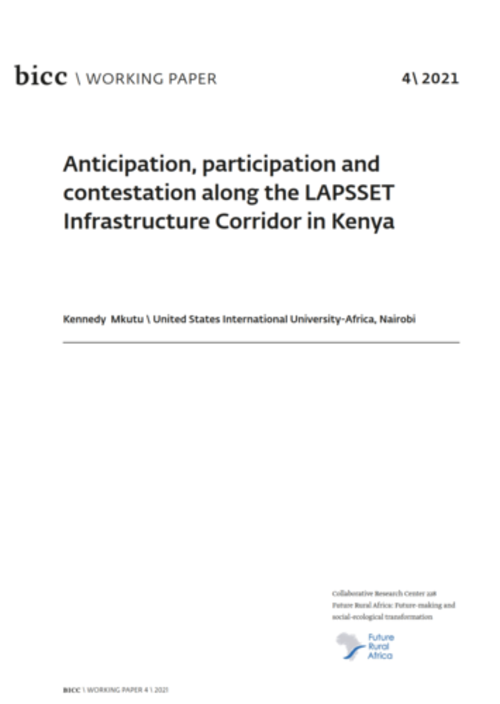Publications
Anticipation, participation and contestation along the LAPSSET Infrastructure Corridor in Kenya
Release Date
2021
Language
- English
Topics
- –
Pastoral counties in northern Kenya are expected to undergo massive social–ecological change in the coming years as a result of the government’s ‘Vision 2030’ with its large-scale investments and infrastructure projects. The Lamu Port–South Sudan–Ethiopia Transport (LAPSSET) corridor project is an ambitious infrastructure development project that links with other continental transport corridors traversing the country. The 500m-wide corridor is to consist of a railway, a highway, a fibre-optic cable and a crude oil pipeline, linking oil fields in Turkana county in the far north-west to a 32-berth port at Lamu on the Kenyan coast. A 50-km wide “special economic zone” straddling the corridor will attract investors, and the development will be accompanied by several associated projects, including three planned resort cities, oil processing facilities and airports. Proponents of the corridor point to its potential to “open up the north” and to reverse previous marginalisation. However, a growing body of work on frontiers and economies of anticipation surrounding development projects points to the potentials for dispossession of local populations and disregard of local dynamics. Further, such projects stimulate future-oriented activities and a variety of visions of the future among the different actors, which may converge or diverge, leading to contestations.
This Working Paper is part of a larger project called “Future Rural Africa: Future-making and social- ecological transformation” by the Universities of Bonn and Cologne and BICC in collaboration with USIU-Africa and other Kenyan universities, which is interested in the kinds of claims being made on land and its resources and how these may change existing dynamics of organised violence. In this Working Paper, the author seeks to understand the dynamics of participation and antici-pation and how these relate to conflict and contestation along the LAPSSET Corridor area (in the following referred to as ‘LAPSSET’). He takes a broad and in-depth look at local dynamics sur-rounding the planned LAPSSET and some associated projects in Isiolo, Samburu and Turkana counties. In doing so, he has found that a variety of actors have different visions and capacities to learn about LAPSSET and position themselves favourably, making it likely that LAPSSET will exacerbate existing political and economic inequalities. Existing inequalities historically run along ethnic lines and are likely to feed into ethnopolitical conflicts. Other findings are that the LAPSSET developments also fuel conflict as they provide new potential targets for dissatisfied citizens to get the attention of the state and new, often inequitable security governance arrangements.
PDF-Download
BICC_Working_Paper_4_2021.pdf
[English] (3.62 MB)

Cite as
@techreport{Mkutu2021,
author = "Kennedy Mkutu",
title = "Anticipation, participation and contestation along the LAPSSET Infrastructure Corridor in Kenya",
latexTitle = "Anticipation, participation and contestation along the LAPSSET Infrastructure Corridor in Kenya",
publisher = "BICC",
number = "4",
institution = "BICC",
type = "BICC Working paper",
year = "2021",
isbn = "2521-781X",
address = "Bonn",
}
Document-Type
BICC Working paper
Publisher
BICC
Place
Bonn
ISSN/ISBN
2521-781X
Countries/Region
Kenya



